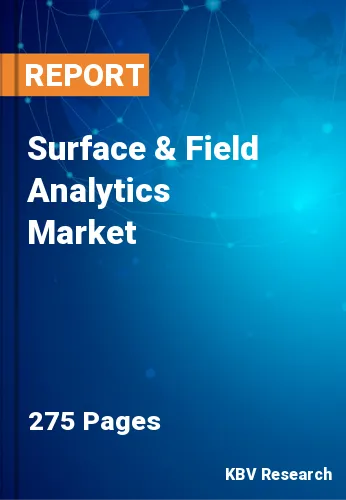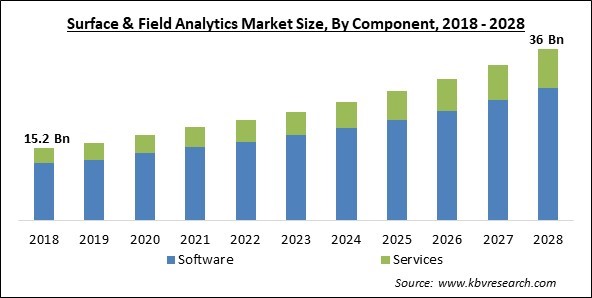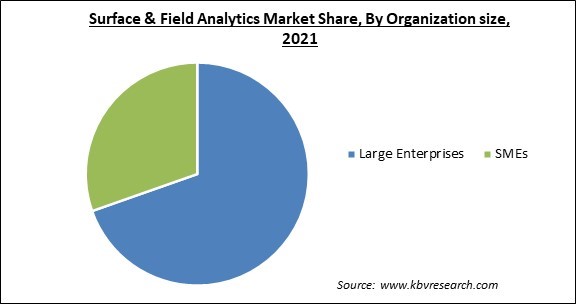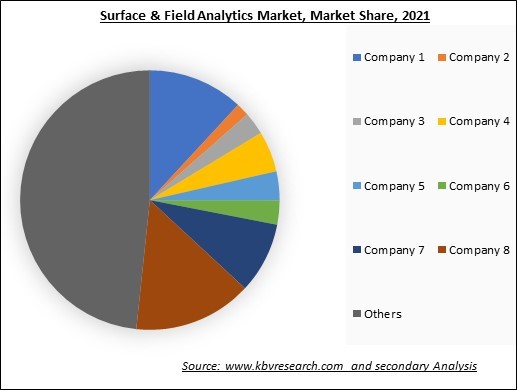
The Global Surface & Field Analytics Market size is expected to reach $36 billion by 2028, rising at a market growth of 9.3% CAGR during the forecast period.
Geospatial analytics uses surface and field analysis to examine various surface types, such as floor elevation and slope. The analysis is employed to improve the performance of currently in-use materials as well as to identify new materials. Spatially extensive data, or information on characteristics that, in theory, may be measured at all sites within a specific region, is a key component of many spatial analysis problems. A large portion of this field's study focuses on landscapes, including analyzing sight lines and routes through landscapes, modeling the shape of surfaces from sparse sample data utilizing interpolation techniques, and investigating the flow of water & materials over surfaces. Temperature, humidity, pressure, trace elements in soil, as well as several other variables, fall under this category. Additionally, there are numerous situations where it is necessary to compare intensive variables (such as counts inside zones, point event data, etc.) with spatially broad data.

The adoption of machine learning (ML), artificial intelligence (AI), and cloud computing-based GIS applications in geospatial analytics has increased, which has led to a significant expansion in the surface & field analytics market. The complexity and capacity to manage the enormous amount of data will increase as firms consume a surge of data. With the help of AI and ML, managing massive amounts of data from many sources, including satellites, aircraft, and ground-based devices, is becoming simple and quick.
Numerous industries, including agriculture, the military, weather monitoring, telecommunications, urban planning & development, maritime surveillance, oil & gas exploration, surveying & cartography, disaster management, energy, healthcare, finance & insurance, business intelligence, and mining, all have applications for these analytics.
The COVID-19 outbreak had a favorable effect on the surface & field analytics market, which experienced growth at the time due to an increase in demand for analytics tools and services. Companies also sought to use this technology to optimize their supply chains and business operations. During the COVID-19 pandemic, a rise in the need for work-from-home opportunities and sanitation trends helped to fuel the development of remote management solutions and surface analytics solutions, hence boosting demand for complete surface & field analytics solutions.
Real-time data exchange is crucial for today's data-driven smart cities. This has facilitated the need to assemble data from many IoT sensors and use surface & field analytics technology to analyze it to produce data visualization on a map for quick, valuable insights. These data can be used to monitor how city services are provided and identify areas where local authority services could improve. Surface and field analytics software support planning, designing, and visualization, as well as construction and project management, operations, and reporting. Urban planning experts use surface & field analytics for analysis, modeling, and visualization. Users get a thorough understanding of the land and infrastructure by analyzing geospatial data via aerial photography, satellite imaging, and remote sensors.
Understanding geography is essential for spotting outbreaks of infectious diseases and for responding to them, especially in the event of pandemics like COVID-19. Epidemiologists can use remote sensing software to map the spread of disease against various factors. This can include demographics, geography, environment, as well as prior infections to understand the pattern, intensity, & source of such outbreaks, along with putting control, prevention, and surveillance measures in place. Increasing remote sensing software use for these applications aids in expanding the surface & field analytics market in the coming years.
Most surface & field analytics solutions like GIS software currently on the market are designed for experienced users and do not adequately integrate resources for efficient computing. They are difficult for other users who have little experience with GIS programming. Therefore, present GIS analytical functions must take advantage of high-performance computing infrastructures for detailed next-generation geographic analysis. Businesses may also use surface & field analytics data to quantify several instances of a particular element or variable to base decisions on factual information. However, a particular dataset can only offer a limited number of data points and be applied to a limited number of issues. Due to the limited accessibility of user location data within enterprises, adopting these analytics tools may be constrained.
Based on Component, the market is segmented into Software, and Services. The services segment procured a considerable growth rate in the surface & field analytics market in 2021. Businesses' increased use of software solutions to obtain location-based business analytics for informed decision-making drives the segment's growth. Furthermore, the use of surface & field analytics software in environmental monitoring and forest management has significantly increased due to climate change.
Based on Vertical, the market is segmented into Smart Cities, Energy & Utilities, Natural Resources, Automotive & Transportation, Defence & Intelligence, Government, Insurance, and Others. The smart cities segment procured the highest revenue share in the surface & field analytics market in 2021. To improve services, smart cities monitor the status of their surroundings and residents' daily activities through technologies like surface & field analytics tools. This is accountable for the expansion of the segment. Greater automation, intelligent transportation & routing, improved monitoring, and better municipal management are all expected benefits of the transition to smart cities.
Based on Organization size, the market is segmented into Large Enterprises, and SMEs. The small and medium enterprises (SMEs) segment garnered a remarkable growth rate in the surface & field analytics market in 2021. SMEs are using surface & field analytics solutions for various functions, assisting them in becoming more productive, intelligent, and efficient. Small and medium-sized enterprises are transitioning their operations to the digital platform.
Based on Deployment Mode, the market is segmented into On-premise, and Cloud. The on premise segment acquired the largest revenue share in the surface & field analytics market in 2021. The firm's servers are installed on the on premise surface & field platforms. These send host web traffic to locally stored web maps. As a result, on premise platforms can enable organizations to develop software development kits (SDKs) to provide clients with solutions that are specifically tailored to their needs.

| Report Attribute | Details |
|---|---|
| Market size value in 2021 | USD 19.6 Billion |
| Market size forecast in 2028 | USD 36 Billion |
| Base Year | 2021 |
| Historical Period | 2018 to 2020 |
| Forecast Period | 2022 to 2028 |
| Revenue Growth Rate | CAGR of 9.3% from 2022 to 2028 |
| Number of Pages | 275 |
| Number of Tables | 460 |
| Report coverage | Market Trends, Revenue Estimation and Forecast, Segmentation Analysis, Regional and Country Breakdown, Market Share Analysis, Companies Strategic Developments, Company Profiling |
| Segments covered | Component, Organization size, Deployment Mode, Vertical, Region |
| Country scope | US, Canada, Mexico, Germany, UK, France, Russia, Spain, Italy, China, Japan, India, South Korea, Singapore, Malaysia, Brazil, Argentina, UAE, Saudi Arabia, South Africa, Nigeria |
| Growth Drivers |
|
| Restraints |
|
Based on Regions, the market is segmented into North America, Europe, Asia Pacific, and Latin America, Middle East & Africa. The North America segment garnered the largest revenue share in the surface & field analytics market in 2021. The market's growth in the North America region is propelled by significant investments and revenue anticipated from the developed nations of the region. The United States pervades North America regarding satellite manufacturing, data imagery, and value-added services. In addition, Canada is making significant investments in the R&D of earth observation SAR satellites for various applications. As a result, it is anticipated that Canada will become more prominent in the surface & field analytics market throughout the forecast period.
Free Valuable Insights: Global Surface & Field Analytics Market size to reach USD 36 Billion by 2028

The leading players in the market are competing with diverse innovative offerings to remain competitive in the market. The below illustration shows the percentage of revenue shared by some of the leading companies in the market. The leading players of the market are adopting various strategies in order to cater demand coming from the different industries. The key developmental strategies in the market are Acquisitions, and Partnerships & Collaborations.
The market research report covers the analysis of key stake holders of the market. Key companies profiled in the report include Bruker Corporation, Carl Zeiss AG, Danaher Corporation, JEOL Ltd., Nikon Corporation, Olympus Corporation, Shimadzu Corporation, Thermo Fisher Scientific, Inc., Waters Corporation, and ULVAC-PHI, Inc. (ULVAC, Inc.)
By Component
By Vertical
By Organization size
By Deployment Mode
By Geography
The global Surface & Field Analytics Market size is expected to reach $36 billion by 2028.
Growing Demand for Analytics Solutions for Smart City Development & Urban Planning are driving the market in coming years, however, Existing Legacy Systems Delaying Next-Generation Integration along with Strict Data Privacy Laws restraints the growth of the market.
Bruker Corporation, Carl Zeiss AG, Danaher Corporation, JEOL Ltd., Nikon Corporation, Olympus Corporation, Shimadzu Corporation, Thermo Fisher Scientific, Inc., Waters Corporation, and ULVAC-PHI, Inc. (ULVAC, Inc.)
The Large Enterprises market has acquired the maximum revenue share in the Global Surface & Field Analytics Market by Organization size in 2021, achieving a market value of $23.9 billion by 2028.
The Software market is leading the Global Surface & Field Analytics Market by Component in 2021, achieving a market value of $27.8 billion by 2028.
The North America market dominated the Global Surface & Field Analytics Market by Region in 2021, achieving a market value of $12.8 billion by 2028.
Our team of dedicated experts can provide you with attractive expansion opportunities for your business.
